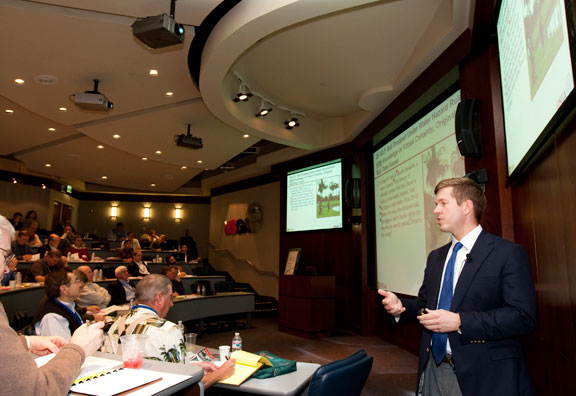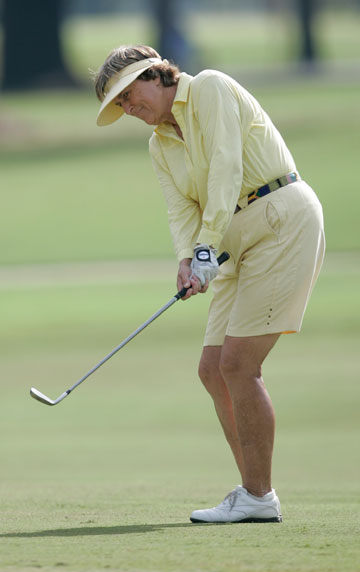Rules Interviews Part 1
ELMSFORD, N.Y. (Apirl 12th, 2010)- All-Star Cast
An unbeatable group of Rules aficionados lent their knowledge and experience for a lively discussion
Interviews by Greg Midland
In the quest to learn as much as possible about how the Rules of Golf are maintained, debated, and changed, The Met Golfer decided to go straight to the source. Our goal was to convene a roundtable of Rules insiders – in many cases, the Rules are their job, or at the very least, their dominant hobby. The panelists:
John Morrissett, USGA Rules Director
Mike Davis, USGA Senior Director of Rules & Competitions
Dick Rugge, USGA Senior Technical Director
Mark Wilson, co-chairman, PGA of America Rules Committee
Glen Nager, chairman, USGA Rules Committee
Bernie Loehr, director, USGA Rules of Golf & Amateur Status
Carol Semple Thompson, seven-time USGA champion and World Golf Hall of Fame member
Q: Why is there so much interpretation involved with the Rules? Why isn’t a Rule just a Rule?
[group laughter] Morrissett: We should probably start with the lawyer [motioning toward Glen Nager].
Nager: I think that’s an issue of both English language and the different philosophies of interpretation. It’s true in the Rules of Golf, and it’s true in the rule of law. Everyone can believe in a Rules system and a legal system, but then how it gets applied to different sets of facts is what causes differences in opinion. On some of these issues, everyone agrees with what the Rule says, but then the question is what is the quantum of facts necessary. If you could come up with a solution to that, you could make a great contribution to Anglo-American jurisprudence as well as to the Rules of Golf!

Morrissett: One thing to keep in mind is that the Rules have evolved over more than 250 years. They’re remnants of everything that Rules of Golf committees have done for a long time, and obviously as well with the combination of different things that can happen on the golf course. These lead to interpretative issues rather than just straightforward questions and answers for everything.
Wilson: I believe that day in and day out, for the most part the game is played with very few questions or disputes. The nature of some questions that arise certainly do arise in situations that may happen occasionally or very infrequently, or maybe only once, but because of modern forms of communication, it’s easy for more people to find out about a situation that happens only once, and it’s clearly easier for more people to participate in Rules discussions. I think that’s a positive development: Probably, there are more people who know the Rules fairly well throughout the world, because of education, and there are probably more people who have an interest in it. And that’s what makes some of these questions arise.
Loehr: The game is played over a wide area, and no two golf courses are the same. And there are all sorts of objects out on the course that can affect the game. Some are natural, some are man-made. There are all kinds of individuals out there that can affect the game. We have to be able to know the status of those objects and those individuals in order to properly interpret the Rules. Most people play in accordance with the Rules, certainly. If you look at the Rules, a lot of them say what you can’t do. So we get an awful lot of questions saying, ‘well, can I do this?” And of course the immediate next question is, why doesn’t it just say that in the Rule book? And it would just be impossible to lay out everything that you can do.
Nager: I think one of the points Mark made is really important. It’s always easy to focus on the things for which there’s disagreement about, but for all of the thousands of stipulated rounds of golf played in the United States or around the world, most people play golf without making a mistake or having a question.
Q: Obviously the Rules have evolved. When is the next Quadrennial, and what happens in between those conferences to allow the Rules to evolve?
Morrissett: The next set of Rules changes will take place January 1, 2012. And the Quadrennial for that is going to be held in January 2011. So the Rules change and review process, along with the Decisions, is an ongoing one. In a typical year, the USGA Rules of Golf Committee will meet three times. The R&A’s Rules Committee might meet four times, and then the USGA and the R&A meet twice each year. So in each four-year cycle, they meet a total of eight times. So it’s not like they just meet once every four years and say, ‘what are we going to do?’ For instance, the proposed Rules changes for 2012 have been discussed as soon as the 2008 Rules changes took effect.
Nager: And some of the things we’re considering now are things that the Committee started discussing before 2008, but there wasn’t agreement about. So they may be discussed for another six, or even eight years.
Q: What first attracted you to the Rules of Golf?
Davis: One of the things I find very compelling is that these rules apply to everyone. So no matter whether you’re a tour professional or a higher handicap or whether you’re a junior, senior, male, female, everyone plays under the same Rules of Golf, which I think has a lot of appeal to it. They’re a tremendously complicated set of Rules because, when you look at other sports, typically your arena is very confined. In golf, you have 18 holes; you’ve got match play vs. stroke play, singles vs. four-ball vs. foursome, all kinds of things that can happen. Once you get into the Rules, you learn that you really have to embrace them fully or not get involved at all, because they are so complicated.
Morrissett: Frankly, I was just looking for a job [laughter]. I grew up in Richmond, Virginia, and my family was friends with the late Harry Easterly, a past president of the USGA as well as a past Rules chairman. He suggested that if I wanted to work for the USGA, I ought to learn the Rules. So that sent me down the path of going to Rules workshops in the hopes of getting a job with the USGA.
Loehr: I’ve always enjoyed puzzles and logic and analytical things. That’s what makes this job enjoyable every day — the fact that you have to sit down and take apart and analyze each little part and put it all back together.
Wilson: I’ve always been interested in language and words; in fact, my college degree is in history and I have a minor in English, and I had a lot of people, including my parents, who thought I should go to law school. And instead I decided to become a golf professional! I realized that if I became good and could work hard on the Rules, there was an avenue for me to become involved at a level that I never would have been involved in as a player. So that was a great incentive for me to pursue this, and it’s been fantastic. It’s just a blast.

Thompson: I think it’s probably genetic for me. I had grown up very aware of the Rules because of my father’s involvement with the USGA [Harton “Bud” Semple, was a past president of the USGA]. I’ve been told about the Rules all my life. When I was in my late teens and 20s, we’d have Rules discussions at the dinner table. Dad would bring home these rules quizzes and he’d say, “Okay, what happens if…” and we’d discuss Rules situations. So he’d quiz me, and of course I’d argue that he was wrong [laughs].When I became somewhat successful in my competitive career, it became important to me to get myself around the golf course. It became sort of a matter of pride.
Q: Carol, what was your most memorable Rules situation as a competitor?
Thompson: Probably being disqualified [smiles]. It was in the 1974 World Amateur Team Matches. I had hit my ball into a lateral hazard, and I dropped out to the side. It was a team competition, and my captain came rushing over and said, ‘You dropped in the wrong place. You have to go behind the hazard to drop.’ It was the 18th hole, and I picked up my ball and re-dropped, finished out the hole, and then I walked into the scoring tent and they said, ‘We’re considering whether or not to disqualify you.’ And they did. I was only disqualified for the one day, fortunately.
